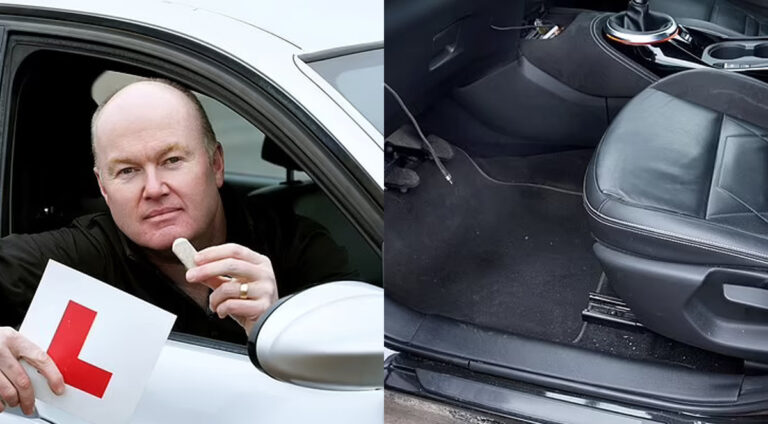Teen fails driving test because the car was TOO DIRTY
We all know how nerve-racking driving tests are. The 40-minute preview of our skills—including an eyesight check, vehicle safety questions, reversing and general driving test—is a legal rite of passage for most teenagers entering adulthood. Lately, however, there’s an undesirable factor that examiners are looking into and rejecting drivers for before they even start their engines: dirty cars.
One such teenager was left distraught after an examiner failed her for having tiny pencil rubber filings on the carpet underneath the passenger seat. Spoiler alert: she was driving her instructor’s car!
After the examiner refused to get in the vehicle, the instructor asked for a second opinion—which was blatantly refused. The 17-year-old, who had been waiting months to take the test, now fears to sit behind the wheel ever since the incident took place at the Blackpool Test Centre.
“It was the instructor’s car and it was spotless apart from a few tiny bits of rubber from when the instructor had rubbed something out of his diary,” Paul Turner, the 17-year-old’s father from Saint Michaels on Wyre, said—as noted by the Daily Mail. “The filings weren’t on the seat or anywhere where the examiner would be sitting. It wasn’t like there were crisp packets and empty tins everywhere, it’s ridiculous.”

According to Turner, the examiner and her instructor spent around ten minutes trying to sort things out, but got nowhere. “So she failed without even driving the car and there’s no way of getting the money back,” he admitted, adding how his daughter was “in floods of tears.”
“I can’t see a reason why he couldn’t get into the car,” he continued. “At the end of the day, these people are civil servants and they need to be accountable.”
Given the delays caused by the COVID-19 pandemic, it currently costs £64 to take a practical driving test in the UK—with a four to five months waiting list for drivers. Theory tests taken before the practical ones also expire after two years, further adding to the pressure faced by those stuck on the list.
Things are further complicated for the 17-year-old in question. “We live in a rural community, we don’t have buses…” Turner said, explaining that his daughter will be graduating soon and a failed driving test will hinder her job prospects. “Not only that, but this is one of the most nerve-racking things a teenager does. It’s one of those stand-out moments in your life and this has just made it worse.”
The Daily Mail also noted how dozens of other drivers have mentioned their tests being declined over new hygiene standards—implemented as a new COVID-busting bid by the Driver and Vehicles Standards Agency (DVSA). On these terms, one Norwich driver failed the test due to mud in the footwell of their car while others were rejected over blades of grass and even strands of hair.
A quick scroll through the Google reviews on Blackpool Test Centre also reveals how three others have failed because of “picky” examiners finding fault with cleanliness. One user, who had followed the guidance for COVID cleaning, highlighted how an examiner still refused to take her son-in-law for the practical test.
“Not sure what he was planning on doing on the floor of the back of the car where he’d spotted a couple of small hairs,” the user wrote. “All surfaces were clean & no rubbish or unnecessary items anywhere as was recommended!!”
When the Daily Mail reached out to DVSA, the organisation refused to comment on individual cases and hesitated to state if the examiners were being investigated or not. However, a spokesperson outlined that DVSA’s priority is to “protect our customers and staff and stop the spread of COVID-19.”
“Guidance has been issued that cars used on driving tests must be cleaned before the test to lessen the chance of infection. Driving tests will not go ahead if this has not been followed to ensure public safety,” they explained. “The guidance for people wishing to take a test is that you must clear and clean the inside of your car before your test.”
That being said, the new measures evidently lack proper specifications as to what deems vehicles ‘dirty’ and ‘infection-prone’. The fact that these allegations are raised at a time when there is a backlog of people wanting to take their tests does not help its case either.





